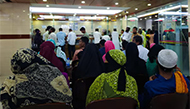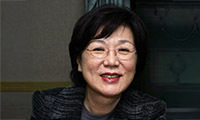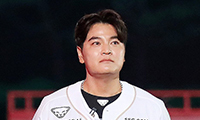
Women around the world are wielding greater political power. In Janakpur, Nepal, women voted in April on an assembly to rewrite the constitution.
Is there really such a thing as a “women’s issue” anymore?American news organizations and pollsters tread familiar territory this campaign season in asking “what women want,” but it’s a vague question. (Think of its opposite: What do men want- It’s a question that doesn’t get asked.)
One thing is clear, though: how women vote does matter deeply to Republicans and Democrats. American women have voted in greater proportions than men for almost three decades - in 2004, nearly nine million more women voted than men, 67.3 million to 58.5 million.
In the presidential election on November 4, the first with a Republican woman on the ticket, some voters say they will make their decision based on a single issue: abortion.
Amy and Scott Siegel of Neenah, Wisconsin, fall in the camp of Senator John McCain and Governor Sarah Palin. “We basically vote pro-life,” Ms. Siegel, a mother of five, told Steven Greenhouse of The New York Times. “As a ‘little person,’ I don’t feel that any of these candidates have our best interests in mind. So if there’s a specific thing that sways our vote, it would be abortion.”
Leone Brickler, who works at a cheese factory, said she supported Senator Barack Obama because of his plans to revamp health care.
“I think Obama will do good if he is given a chance,” she told two labor union organizers in Mr. Greenhouse’s article. “I hear people say he’s all for the black people, but I think he will do what’s right for the Chinese, the whites, the Hispanics, for everyone.”
Even Newsweek magazine cast “What Women Want” as the cover story of its September 22 issue. In response, a reader, Kaja Dunn of Virginia Beach, Virginia, had a letter published in the October 6 issue: “We want a strong economy, educational opportunities, some hope of being able to raise a family or buy a house in the future, affordable health care, a fair shot in the workplace a nd equal pay.”
A lot of Ms. Dunn’s agenda would seem to appeal to voters no matter what their sex.
One thing that some women clearly do want is power, and they are seeking it, with successes and failures, on many political stages: Ms. Palin and Hillary Rodham Clinton in the United States, Angela Merkel in Germany, Cristina Fernandez de Kirchner in Argentina, Segolene Royal in France, Tzipi Livni in Israel.
Even Afghanistan, long a pitiful place for women, is making progress. In Bamian Province, a relatively peaceful corner of the country, women are working in public offices and police stations. There is even a female governor, the first and only one in Afghanistan.
Nahida Rezai, 25, is the first woman to join the police force there . “I received some threats by telephone,” she said, in an article by Carlotta Gall of The Times. “But now I am working as a police officer, I think nothing can deter me.”
Senator Cecilia Lopez Montano, the speaker of the opposition Liberal Party in Colombia, said in an article by Neil MacFarquhar of The Times: “We need to convince women that the only way to really make a change is to stop complaining and just be the owner of power.
It is a huge fight because men have been controlling power for centuries.”
Power. Perhaps it’s the last remaining “women’s issue,” after all.
스마터리빙
more [ 건강]
[ 건강]이제 혈관 건강도 챙기자!
[현대해운]우리 눈에 보이지 않기 때문에 혈관 건강을 챙기는 것은 결코 쉽지 않은데요. 여러분은 혈관 건강을 유지하기 위해 어떤 노력을 하시나요?
 [ 건강]
[ 건강]내 몸이 건강해지는 과일궁합
 [ 라이프]
[ 라이프]벌레야 물럿거라! 천연 해충제 만들기
 [ 건강]
[ 건강]혈압 낮추는데 좋은 식품
[현대해운]혈관 건강은 주로 노화가 진행되면서 지켜야 할 문제라고 인식되어 왔습니다. 최근 생활 패턴과 식생활의 변화로 혈관의 노화 진행이 빨라지고
사람·사람들
more많이 본 기사
- ‘함께 가는 저녁길’· ‘톰과제리’ 성우 송도순 별세
- “라면, 못 끊겠다면 ‘이거’라도 넣어라”
- 中왕이 “日일부세력, 역사 후퇴 시도…韓, 올바른 입장 취해야”
- 재외동포, 2년 새 7만5천명 줄었다…181개국에 700만 명 거주
- 새해엔 평화 찾아올까…지구촌 희망 찬 신년 맞이
- 미국 정부, TSMC에도 美반도체장비 中공장 반입 허가
- ‘붉은 말의 해’ 동해안 해맞이객 북적… “건강·평안” 소망 기원
- “트럼프 리조트의 마사지사들, 엡스타인에 방문 서비스 제공”
- ‘붉은 말의 해’ 열리다
- 권혁인 목사 /UMC 한인총회장 /산타클라라 연합감리교회
- 폭설 속 산행 비극… 마운트 볼디서 3명 조난 사망
- 美국무부 “韓정통망법에 중대 우려…美플랫폼기업에 부정적”
- 트럼프 “시카고·LA 등서 軍철수…범죄늘면 더 강하게 재배치”
- 알고보니 ‘완전식품’인 고구마의 놀라운 효능
- “치매에 치즈가 좋대서 맨날 먹었는데”… 고지방 주의
- 이진수 목사/북가주남침례교협 회장/헤이워드 침례교회
- 새크라멘토 CBMC 송년모임 열어
- 김신호씨, KARL 신임 회장 취임
- SF 상공회의소 차기회장에 그린장 SF한인회 부회장
- 조계종 총무원장 신년 메시지
- 천주교 정순택 대주교 신년 메시지
- <종교인 칼럼> ‘자신의 정체성’
- 뉴욕증시 주요지수 3년 연속 상승…S&P500 연간 16%↑
- 낸시랭, 사채 빚 15억 떠안았다..오열 고백 “좀비떼처럼 뜯어 먹어”
- 원·달러 환율… 연평균 기준 ‘역대최고’ 마감
- ‘상간녀 의혹’ 숙행, 리액션만 간신히 건졌다..무대는 통편집
- 조세호 ‘조폭 연루설’ 털고 빠른 복귀 수순.. ‘도라이버’ 시즌4 합류
- 오픈AI 직원, 올해 평균 150만 달러치 주식 받아…역대 빅테크 최고
- 말리·부르키나파소 “미국인 오지마”…美입국 금지에 맞불
- “추신수는 지울 수 없는 발자취 남겼다” 美 야구기자, 명예의 전당 투표서 ‘CHOO 선택’ 이유 밝혔다
- [새해 달라지는 교통법규] 과속·음주운전 처벌 가주서 대폭 강화
- 지방세 공제한도 1만→4만달러로 상향 1
- ‘첫 무슬림 뉴욕시장’ 맘다니, 취임… 1
- 트럼프, 집권2기 첫 법안 거부권… ‘보복성’ 권한 행사 논란
- “10년간 모든 이민 전면 금지?” 황당 주장
- ■ 발언대 / 2026년이 전성기의 시작인 이유
- 美, 베네수 석유 사업 회사·선박 제재… “마두로 압박 계속”
- 트럼프팀, 우크라·유럽 3국과 종전 논의… “새해에도 지속”
- 백악관 “미네소타 이어 他민주당 州들… 1
- “메타, 사기광고 규제 피하려 검색결과 조작…대응지침도 마련”
- [한인 은행장 신년사 통해 본 비전과 경영 목표] “끊임없는 변화와 혁신으로 안정적 성장 도모”
- LA 북쪽 테혼 카지노서 하룻새 10만불 ‘연속 잭팟’
- 코스트코행 40만달러 랍스터 도난당해...‘스푸핑, 위장트럭’까지…워싱턴주 등 미 화물절도 극성
- ‘아듀~ 2025!’… 희망찬 새해로
- 불체자 의심 메디케이드 정보 공유 허용
- 가주 판매 간 소고기 ‘이콜라이’ 오염
- 美, 韓정통망법에 ‘검열·빅테크 규제’ 우려…외교갈등 비화하나
- “美서 학생 백신 접종률 급감”… ‘백신의 정치화’ 여파
- [인터뷰-문경환 한인회장] “캔자스, 이민자들에 제2의 기회의 땅”
- 샴페인, 마지막 날과 첫날을 위하여
1/5지식톡

-
 미 육군 사관학교 West Poin…
0
미 육군 사관학교 West Poin…
0https://youtu.be/SxD8cEhNV6Q연락처:wpkapca@gmail.comJohn Choi: 714-716-6414West Point 합격증을 받으셨나요?미 육군사관학교 West Point 학부모 모…
-
 ☝️해외에서도 가능한 한국어 선생님…
0
☝️해외에서도 가능한 한국어 선생님…
0이 영상 하나면 충분합니다!♥️상담신청문의♥️☝️ 문의 폭주로 '선착순 상담'만 진행합니다.☎️ : 02-6213-9094✨카카오톡ID : @GOODEDU77 (@골뱅이 꼭 붙여주셔야합니다…
-
 테슬라 자동차 시트커버 장착
0
테슬라 자동차 시트커버 장착
0테슬라 시트커버, 사놓고 아직 못 씌우셨죠?장착이 생각보다 쉽지 않습니다.20년 경력 전문가에게 맡기세요 — 깔끔하고 딱 맞게 장착해드립니다!장착비용:앞좌석: $40뒷좌석: $60앞·뒷좌석 …
-
 식당용 부탄가스
0
식당용 부탄가스
0식당용 부탄가스 홀세일 합니다 로스앤젤레스 다운타운 픽업 가능 안녕 하세요?강아지 & 고양이 모든 애완동물 / 반려동물 식품 & 모든 애완동물/반려동물 관련 제품들 전문적으로 홀세일/취급하는 회사 입니다 100% …
-
 ACSL 국제 컴퓨터 과학 대회, …
0
ACSL 국제 컴퓨터 과학 대회, …
0웹사이트 : www.eduspot.co.kr 카카오톡 상담하기 : https://pf.kakao.com/_BEQWxb블로그 : https://blog.naver.com/eduspotmain안녕하세요, 에듀스팟입니다…
케이타운 1번가
오피니언
 정숙희 논설위원
정숙희 논설위원샴페인, 마지막 날과 첫날을 위하여
 조지 F·윌 워싱턴포스트 칼럼니스트
조지 F·윌 워싱턴포스트 칼럼니스트 [조지 F. 윌 칼럼] 저무는 2025년에 안도의 한숨
 김동찬 시민참여센터 대표
김동찬 시민참여센터 대표 [미국은 지금] 책임 있는 자본 없으면 커뮤니티 미래도 없다
 성영라 수필가 미주문협 부이사장
성영라 수필가 미주문협 부이사장 [수요 에세이] 다시, 제자리로 돌아와서
 신경립 / 서울경제 논설위원
신경립 / 서울경제 논설위원 [만화경] 경영자의 ‘문제적’ 사과
 문태기 OC지국장
문태기 OC지국장 한인 정치력 업그레이드 기대
 민경훈 논설위원
민경훈 논설위원세계 역사를 바꾼 동물
 박홍용 경제부 차장
박홍용 경제부 차장 한인사회가 주목해야 할 새해 경제
 박영실 시인·수필가
박영실 시인·수필가 [화요칼럼] 피드백
1/3지사별 뉴스

지방세 공제한도 1만→4만달러로 상향
2026년 새해에도 뉴욕과 뉴저지 한인들의 일상에 크고 작은 영향을 미치는 다양한 규정과 법규가 새롭게 바뀌게 된다. 당장 1일부터 뉴욕시 최…
■ 사고- 한동대·뉴욕한인청소년센터 국제여름캠프

2025 워싱턴지역 10대 뉴스
다사다난했던 2025년이 하루만 남겨둔 채 역사의 저편으로 저물고 있다. 올해의 가장 큰 뉴스는 트럼프 2기 행정부 출범과 함께 몰아친 이민 …
내년 1월부터 달라지는 MD 법안들

‘붉은 말의 해’ 열리다
‘붉은 말의 해’를 알리기 위해 서울에서는 제야의 종이 울리고 부산에서는 화려한 드론쇼가 펼쳐지는등 세계 각국에서 새해를 맞이했다. 2026년…
권혁인 목사 /UMC 한인총회장 /산타클라라 연합감리교회

오늘 하루 이 창 열지 않음 닫기 




















































.png)


댓글 안에 당신의 성숙함도 담아 주세요.
'오늘의 한마디'는 기사에 대하여 자신의 생각을 말하고 남의 생각을 들으며 서로 다양한 의견을 나누는 공간입니다. 그러나 간혹 불건전한 내용을 올리시는 분들이 계셔서 건전한 인터넷문화 정착을 위해 아래와 같은 운영원칙을 적용합니다.
자체 모니터링을 통해 아래에 해당하는 내용이 포함된 댓글이 발견되면 예고없이 삭제 조치를 하겠습니다.
불건전한 댓글을 올리거나, 이름에 비속어 및 상대방의 불쾌감을 주는 단어를 사용, 유명인 또는 특정 일반인을 사칭하는 경우 이용에 대한 차단 제재를 받을 수 있습니다. 차단될 경우, 일주일간 댓글을 달수 없게 됩니다.
명예훼손, 개인정보 유출, 욕설 등 법률에 위반되는 댓글은 관계 법령에 의거 민형사상 처벌을 받을 수 있으니 이용에 주의를 부탁드립니다.
Close
x